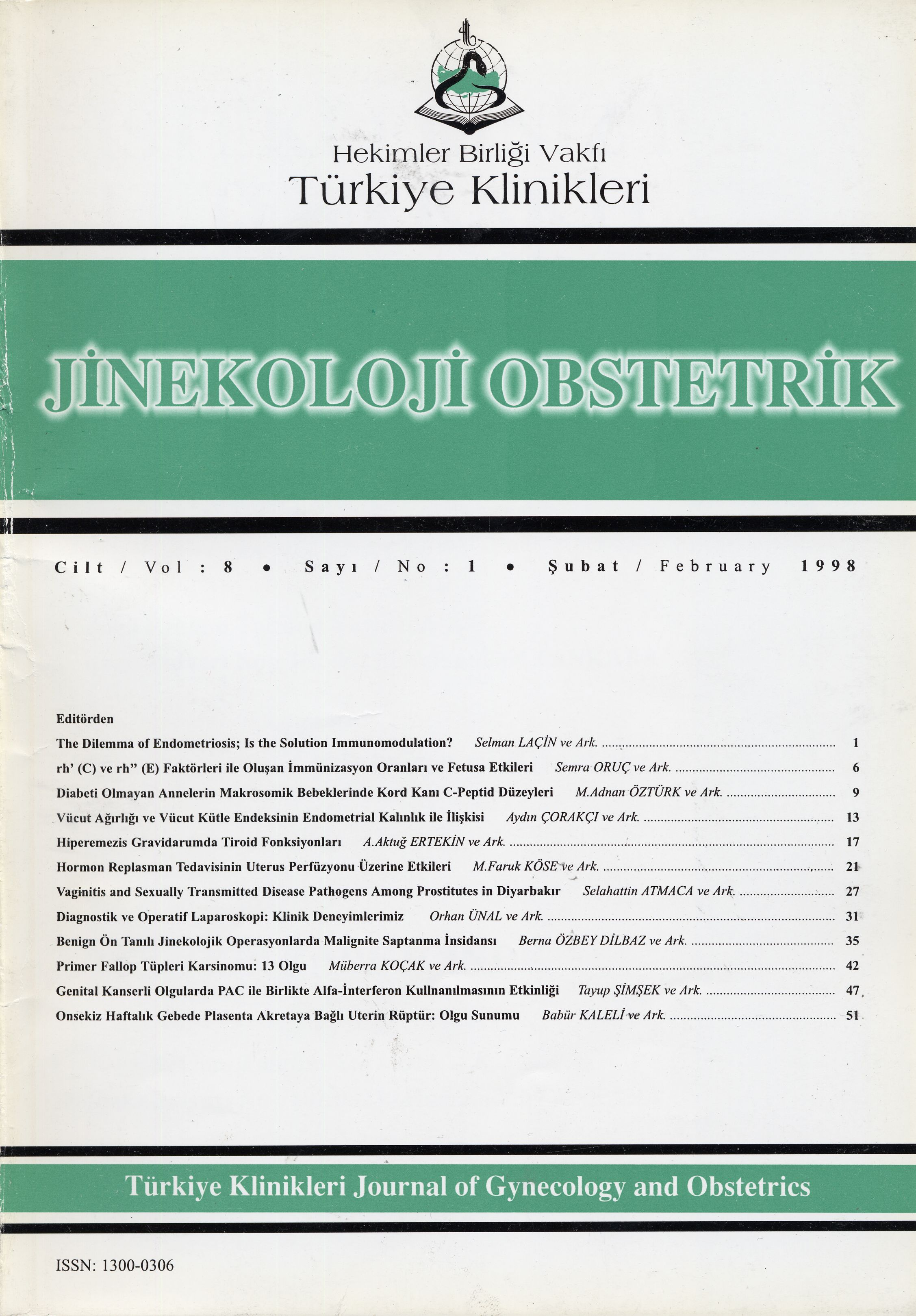Open Access
Peer Reviewed
ARTICLES
3410 Viewed1298 Downloaded
Thyroid Functions In Hyperemesis Gravidarum
Hiperemezis Gravidarumda Tiroid Fonksiyonları
Turkiye Klinikleri J Gynecol Obst. 1998;8(1):17-20
Article Language: TR
Copyright Ⓒ 2025 by Türkiye Klinikleri. This is an open access article under the CC BY-NC-ND license (http://creativecommons.org/licenses/by-nc-nd/4.0/)
ÖZET
Amaç: Hiperemezis gravidarum olgularında tiroid fonksiyonlarında ortaya çıkan değişiklikler araştırıldı. Çalışmanın Yapıldığı Yer: GATA Haydarpaşa Eğitim Hastanesi, Kadın Hastalıkları ve Doğum Kliniği. Materyel ve Metod: Kliniğimizde 16 haftadan küçük toplam 102 olgu, bulantı, kusma ve ketonürisi olan hiperemezis gravidarum (Grup I, 62 olgu) ve bulantı-kusması olmayan kontrol grubu (Grup II, 40 olgu) olarak ayrılarak, bu olgularda tiroid fonksiyon testleri araştırıldı. Üriner sistem enfeksiyonları ile molar ve çoğul gebeliği olanlar çalışmaya alınmadılar. Bulgular: Birinci ve ikinci grupta, sırasıyla tiroid stimulan hormon değerleri 1.02 (±0.8) / 1.72 (±1.02) mIU/ml, total triiodotironin 166.5 (±41.75)/141.09 (±43.62) ng/dl ve total tetraiodotironin değerleri 11.51 (±2.81)/10.43 (±2.91) mg/dl olarak bulundu. Birinci grupta TSH ikinci gruptan anlamlı olarak düşük, TT3 değerleri yüksek (p<0.05) ve TT4 değerleri ikinci gruptan yüksek olmakla birlikte anlamlı fark yoktu (p>0.05). Ayrıca birinci grupta olguların %46.77sinde kilo kaybı, %29.03ünde antiemetik kullanımı gereği, ikinci grupta ise %27.5 olguda kilo kaybı ve %17.5 olguda antiemetik kullanımı gerektiği saptandı. Sonuç: Hiperemezis gravidarumda tiroid fonksiyon testlerinde değişiklikler olmakla birlikte patolojik boyutlarda sapma olmamaktadır. Bu sebeple anamnezinde tiroid hastalığı bulunmayan olgularda tiroid fonksiyonlarını araştırma gereği olmadığı sonucuna varılmıştır.
Amaç: Hiperemezis gravidarum olgularında tiroid fonksiyonlarında ortaya çıkan değişiklikler araştırıldı. Çalışmanın Yapıldığı Yer: GATA Haydarpaşa Eğitim Hastanesi, Kadın Hastalıkları ve Doğum Kliniği. Materyel ve Metod: Kliniğimizde 16 haftadan küçük toplam 102 olgu, bulantı, kusma ve ketonürisi olan hiperemezis gravidarum (Grup I, 62 olgu) ve bulantı-kusması olmayan kontrol grubu (Grup II, 40 olgu) olarak ayrılarak, bu olgularda tiroid fonksiyon testleri araştırıldı. Üriner sistem enfeksiyonları ile molar ve çoğul gebeliği olanlar çalışmaya alınmadılar. Bulgular: Birinci ve ikinci grupta, sırasıyla tiroid stimulan hormon değerleri 1.02 (±0.8) / 1.72 (±1.02) mIU/ml, total triiodotironin 166.5 (±41.75)/141.09 (±43.62) ng/dl ve total tetraiodotironin değerleri 11.51 (±2.81)/10.43 (±2.91) mg/dl olarak bulundu. Birinci grupta TSH ikinci gruptan anlamlı olarak düşük, TT3 değerleri yüksek (p<0.05) ve TT4 değerleri ikinci gruptan yüksek olmakla birlikte anlamlı fark yoktu (p>0.05). Ayrıca birinci grupta olguların %46.77sinde kilo kaybı, %29.03ünde antiemetik kullanımı gereği, ikinci grupta ise %27.5 olguda kilo kaybı ve %17.5 olguda antiemetik kullanımı gerektiği saptandı. Sonuç: Hiperemezis gravidarumda tiroid fonksiyon testlerinde değişiklikler olmakla birlikte patolojik boyutlarda sapma olmamaktadır. Bu sebeple anamnezinde tiroid hastalığı bulunmayan olgularda tiroid fonksiyonlarını araştırma gereği olmadığı sonucuna varılmıştır.
ANAHTAR KELİMELER: Hiperemezis gravidarum, Tiroid fonksiyonları
ABSTRACT
Objective: The aim of the study was to investigate thyroid functions in hyperemesis gravidarum. Institution: Gülhane Military Medical Academy, Haydarpaşa Training Hospital, Department of Obstetrics and Gynecology. Materials and Methods: Thyroid functions were investigated in 102 women who had hyperemesis gravidarum (Group I, 62 patients) and cases who had not emesis (Group II, 40 cases). Gestational age were less than 16 weeks in both of the groups. Patients who had urinary tract infections, multiple and molar pregnancies were excluded from the study. Findings: The mean values of thyroid stimulating hormone were 1.02 (±0.8)/1.72 (±1.02) mIU/ml, total triiodithyronine 166.5 (±41.71)/141.09 (±43.62) ng/dl and total tetraiodothyronine 11.51 (±2.81)/10.43 (±2.91) mg/dl in the first and second groups, respectively. TSH decreased and TT3 levels increased in the first group (p<0.05) and TT4 levels also increased in the first group but was not significant (p>0.05). In the first and second groups weight loss was detected in 46.77/17.5% of patients and 29.03/17.5% of patients needed antiemetic use, respectively. Results: There may be changes of thyroid functions in normal limits that do not need medication in hyperemesis gravidarum. The evaluation of thyroid functions in hyperemesis gravidarum is unnecessary if thyroid disease was not present in history.
Objective: The aim of the study was to investigate thyroid functions in hyperemesis gravidarum. Institution: Gülhane Military Medical Academy, Haydarpaşa Training Hospital, Department of Obstetrics and Gynecology. Materials and Methods: Thyroid functions were investigated in 102 women who had hyperemesis gravidarum (Group I, 62 patients) and cases who had not emesis (Group II, 40 cases). Gestational age were less than 16 weeks in both of the groups. Patients who had urinary tract infections, multiple and molar pregnancies were excluded from the study. Findings: The mean values of thyroid stimulating hormone were 1.02 (±0.8)/1.72 (±1.02) mIU/ml, total triiodithyronine 166.5 (±41.71)/141.09 (±43.62) ng/dl and total tetraiodothyronine 11.51 (±2.81)/10.43 (±2.91) mg/dl in the first and second groups, respectively. TSH decreased and TT3 levels increased in the first group (p<0.05) and TT4 levels also increased in the first group but was not significant (p>0.05). In the first and second groups weight loss was detected in 46.77/17.5% of patients and 29.03/17.5% of patients needed antiemetic use, respectively. Results: There may be changes of thyroid functions in normal limits that do not need medication in hyperemesis gravidarum. The evaluation of thyroid functions in hyperemesis gravidarum is unnecessary if thyroid disease was not present in history.
MENU
POPULAR ARTICLES
MOST DOWNLOADED ARTICLES





This journal is licensed under a Creative Commons Attribution-NonCommercial-NoDerivatives 4.0 International License.










